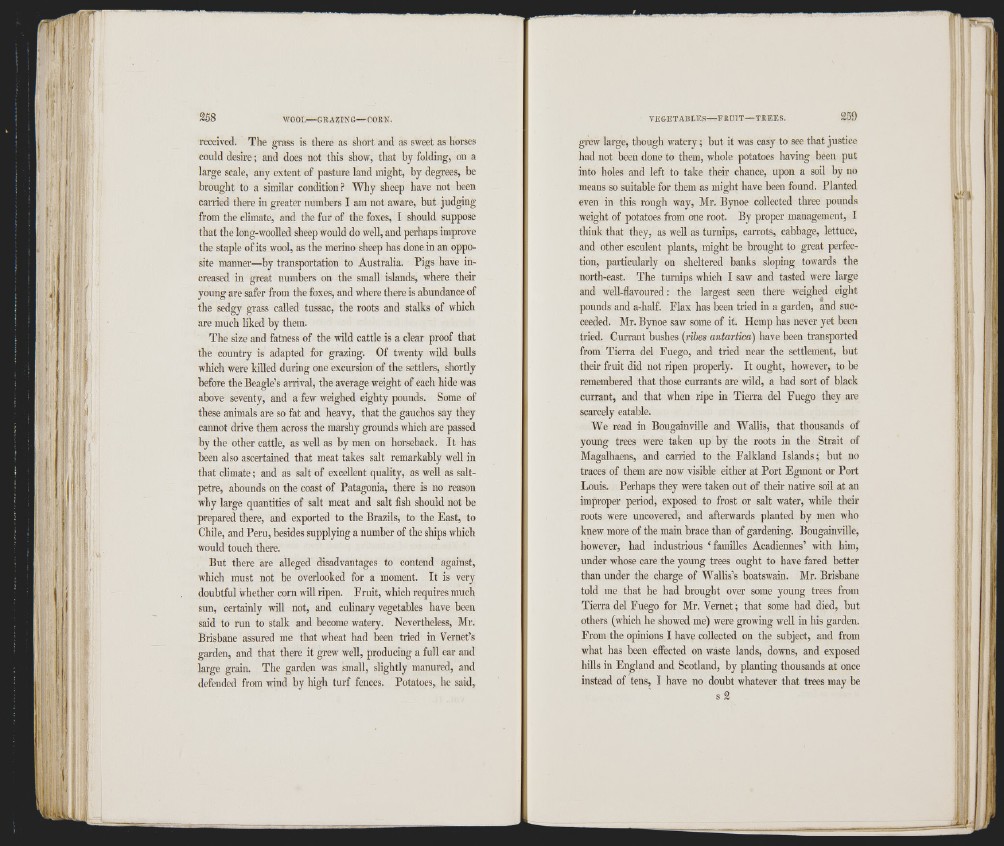
;i
I , i ’
m b !
I*. '
- r
> II
i i
'i ij! i
258 WOOL GEAZIXG— OOKN.
received. The grass is there as short and as sweet as horses
could desire; and does not this show, that by folding, on a
large scale, any extent of pasture land might, by degrees, be
brought to a similar condition.? Why sheep have not been
carried there in greater numbers I am not aware, but judging
from the climate, and the fur of the foxes, I should suppose
that the long-woolled sheep would do well, and perhaps improve
the staple of its wool, as the merino sheep has done in an opposite
manner—by transportation to Australia. Pigs have increased
in great numbers on the small islands, where their
young are safer from the foxes, and where there is abundance of
the sedgy grass called tussac, the roots and stalks of which
are much liked hy them.
The size and fatness of the wild cattle is a clear proof that
the country is adapted for grazing. Of twenty wild bulls
which were kiUed during one excursion of the settlers, shortly
before the Beagle’s arrival, the average weight of each hide was
above seventy, and a few weighed eighty pounds. Some of
these animals are so fat and heavy, that the gauchos say they
cannot drive them across the marshy grounds which are passed
by the other cattle, as well as hy men on horseback. I t has
been also ascertained that meat takes salt remarkably well in
that climate; and as salt of excellent quality, as well as saltpetre,
abounds on the coast of Patagonia, there is no reason
why large quantities of salt meat and salt fish should not be
prepared there, and exported to the Brazils, to the East, to
Chile, and Peru, besides supplying a number of the ships which
would touch there.
But there are alleged disadvantages to contend against,
which must not be overlooked for a moment. It is very
doubtful whether corn will ripen. Fruit, which requires much
sun, certainly will not, and culinary vegetables have been
said to run to stalk and become watery. Nevertheless, Mr.
Brisbane assured me that wheat had been tried in Vernet’s
garden, and that there it grew well, producing a full ear and
large grain. The garden was small, slightly manured, and
defended from wind by high turf fences. Potatoes, he said,
i
VEGETABLKS FRUIT—TREES. 259
grew large, though watery; but it was easy to see that justice
had not been done to them, whole potatoes having been put
into holes and left to take their chance, upon a soil by no
means so suitable for them as might have been found. Planted
even in this rough way, Mr. Bynoe collected three pounds
weight of potatoes from one root. By proper management, I
think that they, as well as turnips, carrots, cabbage, lettuce,
and other esculent plants, might be brought to great perfection,
particularly on sheltered banks sloping towards the
north-east. The turnips which I saw and tasted were large
and well-flavoured; the largest seen there weighed eight
pounds and a-half. Flax has been tried in a garden, and succeeded.
Mr. Bynoe saw some of it. Hemp has never yet been
tried. Currant bushes (ribes antartica) have been transported
from Tierra del Fuego, and tried near the settlement, but
their fruit did not ripen properly. It ought, however, to be
remembered that those currants are wild, a bad sort of black
currant, and that when ripe in Tierra del Fuego they are
scarcely eatable.
We read in Bougainville and Wallis, that thousands of
young trees were taken up by the roots in the Strait of
Magalhaens, and carried to the Falkland Islands; but no
traces of them are now visible either at Port Egmont or Port
Louis. Perhaps they were taken out of their native soil at an
improper period, exposed to frost or salt water, while their
roots were uncovered, and afterwards planted by men who
knew more of the main brace than of gardening. Bougainville,
however, had industrious ‘ families Acadiennes’ with him,
under whose care the young trees ought to have fared better
than under the charge of Wallis’s boatswain. Mr. Brisbane
told me that he had brought over some young trees from
Tierra del Fuego for Mr. Vernet; that some had died, but
others (which he showed me) were growing well in his garden.
From the opinions I have collected on the subject, and from
what has been effected on waste lands, downs, and exposed
hills in England and Scotland, by planting thousands at once
instead of tens, I have no doubt whatever that trees may be
s 2
il
if.- :